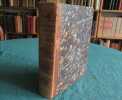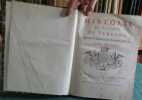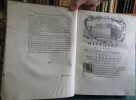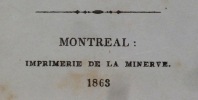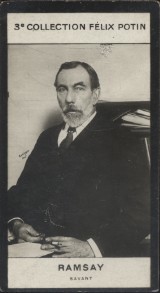207 books for « ramsay a c »Edit
-
Type
Book (210)
New book (1)
Old papers (1)
Photographs (1)
-
Latest
Last month (5)
Last week (1)
-
Language
English (1)
French (211)
German (1)
-
Century
17th (2)
18th (26)
19th (16)
20th (85)
21st (22)
-
Countries
Belgium (7)
Canada (6)
Denmark (14)
France (170)
Germany (1)
Switzerland (15)
-
Syndicate
ALAC (4)
CLAQ (2)
ILAB (116)
NVVA (4)
SLACES (4)
SLAM (91)
Topics
- Alps (1)
- Archaeology (4)
- Architecture (4)
- Arms (1)
- Biography (5)
- Botany (1)
- Byzantium, (1)
- Canada (2)
- Card games (1)
- Chemistry (4)
- Christianity (2)
- Cinema (2)
- Comic strip (4)
- Cooking (3)
- Culinary art (1)
- Curiosa (2)
- Detective novels (6)
- Dictionaries (1)
- Discovery (4)
- Drink (2)
- Early printed books (2)
- Earth (1)
- Education (1)
- Education - morals (1)
- England (2)
- English (15)
- Entomology (2)
- Erotic (1)
- Fenelon (4)
- Fine arts (2)
- Finland (1)
- First edition (2)
- Football (3)
- Football (3)
- Freemasonry (3)
- Gas (1)
- Genealogy (1)
- Geography (5)
- Geology (1)
- Germany (1)
- Helium (1)
- Himalayas (1)
- Historical biography (1)
- History (20)
- Jazz (1)
- Lesourne jacques (1)
- Literature (15)
- Magazine (1)
- Meteorology (1)
- Middle east (3)
- Military arts (4)
- Miller (1)
- Mitchell margaret (2)
- Mountaineering climbing (3)
- Mythology (1)
- New orleans (1)
- Newspapers press (1)
- Pacific (3)
- Paganism (2)
- Painting (1)
- Petrography (1)
- Philosophy (4)
- Photography (1)
- Plate (1)
- Poetry (1)
- Policy (5)
- Quebec (2)
- Quietism (1)
- Religions (7)
- Reviews (1)
- Rome (5)
- Sciences & mineralogy (1)
- Sciences & technique (1)
- Sexuality (1)
- Soul (1)
- Spying (2)
- Tea (4)
- Travel (4)
- Turenne (4)
- United kingdom (2)
- United states (3)
- Various (2)
- War (1)
- Writing - calligraphy (1)
- Xviii th century (1)
- Zoology (2)
The Discovery of the Rare Gases (Inscribed by Morris W. Travers who worked with Sir William Ramsay)
Edward Arnold, London Malicorne sur Sarthe, 72, Pays de la Loire, France 1928 Book condition, Etat : Bon hardcover, editor's binding, full clothes, black spine, dark blue boards, black title-piece In-4 1 vol. - 135 pages
21 texte-figures in black, a plate in frontispiece, photograph of a group in the laboratory in 1896, with Shieds, Sir William Ramsay, Travers, Williams and Kellas 1st edition, 1928 "Contents, Chapitres : Preface, Contents, vii, Text, 128 pages - Chemistry in the early Nineties - A new gas - Elements of compound - An unpublished reply to critics - Helium - Helium and argon, single elements of mixtures - A undiscovered gas - The search for the unknown gas - May and june, 1908 - Krypton and xenon - A difficult problem - Last experiments and Neon - Index - Morris William Travers, FRS (24 January 1872 25 August 1961) was an English chemist who worked with Sir William Ramsay in the discovery of xenon, neon and krypton. His work on several of the rare gases earned him the name Rare gas Travers in scientific circles. He was the founding director of the Indian Institute of Science. - Sir William Ramsay KCB FRS FRSE (2 October 1852 23 July 1916) was a Scottish chemist who discovered the noble gases and received the Nobel Prize in Chemistry in 1904 ""in recognition of his services in the discovery of the inert gaseous elements in air"" along with his collaborator, John William Strutt, 3rd Baron Rayleigh, who received the Nobel Prize in Physics that same year for their discovery of argon. After the two men identified argon, Ramsay investigated other atmospheric gases. His work in isolating argon, helium, neon, krypton and xenon led to the development of a new section of the periodic table." "ex-library copy, the binding is lightly used, top of the spine-end torn, 2 cms missing of clothes on the bottom of the spine, binding remains clean and rather nice, no dust-jacket, inside is in good condition, but with few library markings and book plate, the text is fine and unmarked, the book is incribed by Morris W. Travers to Chaston Chapman (Alfred Chaston Chapman was a chemist with a specialist interest in fermentation and brewing. He was president of the Institute of Brewing and Distilling from 1911-1913. In 1939 his widow donated to Leeds University Library his collection of books). This item is coming from Leeds University Library, with the stamp ""cancelled"". A very interesting paper on the origins of Rare Gases and Sir William Ramsay"
"RAMSAY, WILLIAM & PER THEODOR CLEVE. - THE INDEPENDENTLY DISCOVERY OF HELIUM ON EARTH
Reference : 49284
(1895)
On a Gas showing the Spectrum of Helium, the reputed cause of D3, one of the Lines in the Coronal Spectrum. preliminary Note. (Received March 26, 1895). (+) Helium, a Gaseous Constituent of certain Minerals. Part I. And (P.E. CLEVE:) Sur la présence d...
London, arrison and Sons, 1895. - (Paris, Gauthier-Villars), 1895. 8vo. and 4to. Later full cloth, gilt lettering to spine (Ramsay) and without wrappers (Cleve). In ""Proceedings of the Royal Society"" (Ramsay), Vol. 58. (Entire vol. offered). And in ""Comptes Rendus Hebdomadaires des Séances de L'Academie des Sciences"" (Cleve), Tome 120, No 15. Pp. (797-) 850. (Entire issue offered). Ramsay's papers: pp. 65-67 and pp. 81-89. - Cleve's paper: p. 834. Stamps tp edges and a few corners a bit bumped on vol. 58, otherwise clean and fine.
First printing of both papers in which Ramsay and Cleve - independently - announced their discovery of Helium on the Earth. Although Ramsay announced the discovery of Helium before Cleve had completed his research, the Swedish chemist was independent discoverer of the element.Helium was discovered in the sun already in 1868 by Jules Janssen and independently by Lockyer the same year. Janssen discovered helium in the sun when he observed a total eclipse in India by studying the spectra of the suns chromosphere and Lockyer, also by spectroscopy, found that the new line in the spectrum did not belong to any element then known and he named it Helium for the sun.In the same volume as Ramsays paper there are 5 papers by NORMAN LOCKYER dealing with the discovery of Helium on the earth, examining Ramsay's and Cleve's findings.Parkinson ""Breakthroughs"", 1895.
Les Voyages de Cyrus, Avec un Discours sur la Mythologie.
Amsterdam, Pierre & Mortier, 1728. 8vo. In contemporary vellum. Light wear to extremities and internally a few leaves with miscolouring. An overall nice copy. (8), 187, (3), 180 pp. + 2 frontispieces.
Second edition of Ramsay's work on an imaginary tour of the ancient world undertaken by Cyrus, founder of the Persian Empire. He meets famous figures such as Pythagoras and Zoroaster who give him lessons on how a wise leader should act. The work because very popular and was published in numerous editions.""Les Voyages de Cyrus was first published in 1727 and became a bestseller in France and then in Britain after being translated into English by Nathaniel Hooke, nephew of the Jacobite agent of the same name. Ramsay’s work imagines the travels of Cyrus the Great, the 6th-century BC founder of the first Persian Empire. Cyrus’s early life had been fictionalised by Xenophon of Athens as a way to promote his own political and moral philosophy and Ramsay uses this device to drive his own narrative. The work is also strongly influenced by Archbishop Fénelon’s Les aventures de Télémaque, fils d’Ulysse (The adventures of Telemachus, son of Ulysses). Though Fénelon’s work appears to be set in the time of Homer’s heroes it was immediately seen as a scathing attack on the autocratic rule of Louis XIV and the self-indulgent nature of aristocratic society. Ramsay also draws on the ancient Greek historian Herodotus, notably for a grisly event towards the end of Book 1."" (National Library of Scotland).
FÉNELON (1651-1715). - (RAMSAY, André-Michel de) (1686-1743) relié avec Livino De Meyer
Reference : 22316
(1724)
Histoire de la vie de Messr. François de Salignac de la Motte-Fénelon, archevêque duc de Cambray.- relié avec Parallelum Antiquae et Praesentis Ecclesiae in Praescribenda and Exigenda Fidei Formula Adversus Haereses Exortas, et Veterum Ac Recentium Refractarioru by Livin0 De Meyer Parallelum antiquæ et præsentis Ecclesiæ in præscribenda & exigenda fidei formula adversùs hæreses exortas, et veterum ac recentium refractariorum in eadem formula impugnanda
1724 Bruxelles Chez Eugène Henri Fricx Editeur 1724;pt. in-8°plein veau epoque,dos muet, frontispice gravé + 204 p. + 28 p. biographie de Ramsay, homme de lettres écossais qui devint disciple et ami de Fénelon, qui le convertit au catholicisme vers 1709. Dans cette biographie qui eut beaucoup de succès, Ramsay relate aussi ses rapports avec l'illustre prélat. biography of Fenelon (1651-1715), anonymously published by his friend Andrew Michael Ramsay, who was of Scotish origin lived in France and who had been converted to Catholicism under Fenelons influence. Barbier II/713; Cioranescu 52218; Brunet VI, 30621. relié avec Parallelum Antiquae et Praesentis Ecclesiae in Praescribenda and Exigenda Fidei Formula Adversus Haereses Exortas, et Veterum Ac Recentium Refractarioru by Livin0 De Meyer Parallelum antiquæ et præsentis Ecclesiæ in præscribenda & exigenda fidei formula adversùs hæreses exortas, et veterum ac recentium refractariorum in eadem formula impugnanda.Auteur :Livinus De MeyerÉditeur :Bruxellis : Ex Typographia Joannis De Smedt, 1711.vii, 91, [1] p. ; 17 cm auctore Livino de Meyer.
Remise de 20% pour toutes commandes égales ou supérieures à 100 €
The old glaciers of Switzerland and North Wales.
London, (Spottiswoode for) Longman, Green, and Roberts, 1860, sm. in-8°, 8 p. + 116 p., with 6 text illustrations + 8 engraved plates + 1 folded clrd. map ,Sketch Map showing the course of the Glaciers of Snowdon...’ + 4 p. (publications), Pencilled note to half-title „Sur Abdrew Ramsay married my cousin Louisa WilliamsLlanfairynhornwy“ / Exlibris Peter E. Obergfell, O.-Clothbound, fine copy.
These pages originally appeared as one of the chapters in «Peaks, Passes, and Glaciers», by the members of the Alpine Club. This will account for the appearance of one or two brief passages not essential to the scientific bearing of the subject. Part one (p. 7-34, with 3 text illustrations) is on the old glaciers of Switzerland. This treatise is useful, not only to the geologist specially interested in the study of British glacial phenomena, but also in some degree to the less scientific tourist who explores the mountains and valleys of North Wales. Illustrated with engraved views and diagrams, and one large two-colour folding map ‘Sketch Map showing the course of the glaciers of Snowdon and its neighbourhood, by A.C. Ramsay’. not in Perret. Image disp.

(SLACES, NVVA)
Phone number : 41 (0)26 3223808
Histoire du vicomte de Turenne. Tome 1. Édition originale.
Maréchal général des Armées du Roy, tome premier.Par André Michel de Ramsay dit le chevalier de Ramsay (1693-1743). Le discours qu'il prononce en 1736 est considéré comme un des textes fondateurs de la franc-maçonnerie.Rare édition originale. Paris, chez la veuve Mazieres et J.B. Garnier, imprimeur et libraires de la reine. - 1735 - 597 pages - 1 portrait frontispice et 12 plans de batailles.Reliure demi-basane postérieure. Dos lisse orné insolé et frotté. Titre au dos. Première et dernière page restaurées. Pas de rousseur. Bon état. Format in-4°(29x23).
MEISSONIER
Notes sur la coutume de Paris, indiquant les articles encore en force avec tout le texte de la coutume...
Montréal. Imprimerie de la Minerve. 1863. 1 volume in-12, demi-chagrin brun, dos à nerfs, 1er plat de couverture conservé. [1] f. ; VI pp. ; 101 pp. ; [1] p. bl.
Mention sur la 1ère de couverture qui comprend quelques rousseurs : Offert par l'auteur. Ramsay était avocat.
Geschichte der Amerikanischen Revolution aus den Acten des Congresses der vereinigten Staaten. 4 vols.
Berlin, Vossischen Buchhandlung, 1794 - 1795. 8vo. Uniformly bound in four contemporary (original?) blue cardbord-bindings with author and tome-label in contemporary hand. Small paper-labels pasted on to top of spine. Spines with wear and miscoloured. Internally nice and clean. XVI, 446 pp. IV, 444 pp. (8), 391 pp. (10), 404 pp.
First German edition of Ramsay's landmark work on the American Revolution. David Ramsay is considered to be one of the first major historians of the American Revolution. Sabin 67688.
Racine, Louis ; Rousseau, Jean-Jacques ; Pope, Alexander ; Bréard, Étienne ; Ramsay, Andrew Michael
Reference : 110759
(1777)
La Religion, Poëme ; suivi de : Jugement de M. Rousseau sur le Poëme de la Religion, Lettres entre Louis Racine et Rousseau, Pope, M. de Ramsay et Étienne Bréard, La Grace, poème, Lettre A M. ***, Ode Les Larmes de la Pénitence, Ode a M. Racine Sur la Mort de Son Fils par M. Le Franc, Extrait des dernières lettres de M. Rousseau
Paris, rue Saint Jean de Beauvais, Chez Jean Desaint 1777 In-12 relié plein veau 16 cm sur 9,5. 3ff-383 pages. Dos lisse orné de caissons, fleurons et lettrage dorés. Pièce de titre en maroquin rouge, angle inférieur manquant. Tranches rouges. filet doré sur coupes, petits fleurons et culs-de-lampe dans le texte. Dos frotté avec petits manques, quelques épidermures sur plats. Premier mors intérieur fendu, gouttière irrégulière, pages 29-39 partiellement déliées, quelques brunissures sur les trois dernières pages et dernière page de garde collée au contreplat. Assez bon état d’occasion.
Intéressante correspondance de Rousseau, Pope, Bréard et du fameux masson anglais Ramsay sur le tème de la religion. Louis Racine, fils du célèbre Jean ; son poème “La religion”, défini par La Harpe “un des meilleurs poèmes de second ordre” essaye de concilier raison et religion, dans “La Grace” il fait de la poésie de Saint Augustin et Saint Thomas. Bon état d’occasion
"RAYLEIGH, LORD (J.W. STRUTT) and WILLIAM RAMSAY. - THE DISCOVERY OF ARGON.
Reference : 42221
(1895)
Argon, a New Constituent of the Atmosphere. Received and Read January 31, 1895.
(London, Harrison and Sons, 1895). 4to. No wrappers as extracted from ""Philosophical Transactions"", Vol. 186 - I, Series A. Pp. 187-241 a. 8 textillustrations (apparatus). Fine and clean.
First printing of this importent paper in the history of chemistry, Lord Rayleigh's most famous discovery, announcing the discovery of this new gas, the first finding of one of the rare gases (inert gases) having unusual properties, and forming a distinct group in the periodic table, and all with zero valency.""The original paper in the ""Philosophical Transactions"" will undoubtly rank as a classic, the investigation having been a particularly brilliant ine."" (Ernst von Meyer in History of Chemistry). For this discovery Lord Rayleigh and W. Ramsay received the Nobel Prize (1904).After having made several measuring of the densities of gases, ""Rayleigh came across a curious puzzle. With oxygen, he always obtained the same density, regardless of how the oxygen might be produced, whether from one particular compound, from a second compound, or from the air. The situation was different with nitrogen. The nitrogen he obtained from air constantly showed a slightly higher density than the nitrogen he obtained from any of various compounds. Rayleigh could think of several ways in which the nitrogen obtained from air might be contaminated but none of the possibilities checked out experimentally. He was so frustrated that he went so far as to write to the journal ""Nature"" asking for suggestions. Ramsay, a brilliant Scottish chemist, asked permission to tackle the problem and received it. The upshot was that a new gas, somewhat denser that nitrogen, was discovered to exist in the atmosphere. It was named argon and it was the first of a series of rare gases of unusual properties whose existence had never been suspected.""(Asimow).Dibner, Heralds of Science No. 50 - Neville, Historical Chemical Library vol. II, p.358.
"RAMSAY, WILLIAM and MORRIS W. TRAVERS. - DISCOVERY OF THE ELEMENT KRYPTON.
Reference : 44238
(1898)
On a new Constituent of Atmospheric Air. Received June 8 - Read June 9, 1898.
(London, Taylor and Francis, 1898) No wrappers. In ""Proceedings of the Royal Society of London."", Vol.63, Nos. 399-400 (both issues offered).. Pp. 373-480 a. 5 plates. Ransay & Travers' paper: pp. 405-408.
First appearance of the paper in which Ramsay and Travers announced their discovery of a new element which they named ""krypton"" (meaning hidden).""Dr. William Hampson presented them (Ransay & Travers) with about a liter of liquid air, which they used, not for liquefying the argon, but for obstaining sufficient skill in manipulation so that they would not risk loosing their precious fifteen liter of argon......The residue left after most of the liquid air had boliled away consisted largly of oxygen and nitrogen, which Ramsay and Travers temoved with red-hot copper and magnesium. ....(they) then examined the twenty-five cibic centimeters of residual gas, and when they found it to be inerst, they immediately placedit in a Pl'ucker tube connected to and induction coil and observed its spectrum. There was a bright yelælow line with a greener tint than that of the helium line and a brilliant green line that did nor coincide with any line of argon, helium, mercury, or hydrogen. They discoverede this gas on 30 May, 1898, and named it 'krypton'....they found that it belonged between bromine and rubidium in the periodic table, and so great was their excitement that the younger chemist almost forgot about his examination for doctor of sciwence which had been schedules for the next day.""(Weeks, p. 267).Parkinson ""Breakthroughs"", 1898 C.
"RAYLEIGH, LORD (J.W. STRUTT) and WILLIAM RAMSAY. - THE DISCOVERY OF ARGON.
Reference : 49207
(1895)
Argon, a New Constituent of the Atmosphere. Received and Read January 31, 1895.
London, Harrison and Sons, 1895. 4to. Orig. full cloth. Gilt lettering to spine. Blindtooled covers. First corner a bit bumped. In ""Philosophical Transactions"", Vol. 186 - I, Series A. XIV,(2),602,(4) pp. (Entire volume offered). The paper: p. 187-241 a. 8 textillustrations (apparatus). The title-page with faint brownspots. Otherwise internally clean and fine.
First printing of this importent paper in the history of chemistry, Lord Rayleigh's most famous discovery, announcing the discovery of this new gas, the first finding of one of the rare gases (inert gases) having unusual properties, and forming a distinct group in the periodic table, and all with zero valency.""The original paper in the ""Philosophical Transactions"" will undoubtly rank as a classic, the investigation having been a particularly brilliant ine."" (Ernst von Meyer in History of Chemistry). For this discovery Lord Rayleigh and W. Ramsay received the Nobel Prize (1904). The volume also contains WILLIAM CROOKES ""On the Spectra of Argon"", OSBORNE REYNOLD ""On the Dynamical Theory of Incompressible Viscous Fluids and the determination of the Criterion"", KARL PEARSON ""Contributions to the Mathematical Theory of Evolution. - II. Skew Variations in Homogenous Materials"" etc.After having made several measuring of the densities of gases, ""Rayleigh came across a curious puzzle. With oxygen, he always obtained the same density, regardless of how the oxygen might be produced, whether from one particular compound, from a second compound, or from the air. The situation was different with nitrogen. The nitrogen he obtained from air constantly showed a slightly higher density than the nitrogen he obtained from any of various compounds. Rayleigh could think of several ways in which the nitrogen obtained from air might be contaminated but none of the possibilities checked out experimentally. He was so frustrated that he went so far as to write to the journal ""Nature"" asking for suggestions. Ramsay, a brilliant Scottish chemist, asked permission to tackle the problem and received it. The upshot was that a new gas, somewhat denser that nitrogen, was discovered to exist in the atmosphere. It was named argon and it was the first of a series of rare gases of unusual properties whose existence had never been suspected.""(Asimow).Dibner, Heralds of Science No. 50 - Neville, Historical Chemical Library vol. II, p.358.
Histoire de la vie de Messr. François de Salignac de La Motte-Fenelon, Archeveque Duc de Cambray
1723 La Haye, chez les frères Vaillant et N. Prevost, 1723, in 12 de 204-28 pp., joli frontispice gravé avec le portrait de Fénélon dans un médaillon, rel. plein veau brun moucheté, dos à nerfs orné de fers dorés, pièce de titre de maroquin rouge, bel ex.
Éd. orig. de cette première biographie de Fénelon par son ami André Michel de Ramsay (1686-1743). A la fin de l'ouvrage se trouve Le "Discours philosophique sur l'amour de Dieu" de Fénelon. Rappelons que Ramsay, écossais d'origine vivant en France, se convertit au catholicisme sous l'influence de Fénélon.
Est-ce un meurtre ? (You can't Call it Murder)
Collection Red Label - Editions PAC (1978) - Edition originale - In-12 broché de 236 pages - Couverture glacé rouge - Traduit de l'anglais par France-Marie Watkins - Très bon état
Collection dirigée par François GUERIF
Approche des ténèbres (The Dark Descends)
Collection Red Label - Editions PAC (1978) - Edition originale - In-12 broché de 204 pages - Couverture glacé rouge - Traduit de l'anglais par Joëlle Ginsberg - Très bon état
Collection dirigée par François GUERIF
Discrétion de mort (Deadly Discretion)
Collection Red Label - Editions PAC (1980) - Edition originale - In-12 broché de 190 pages - Couverture glacé rouge - Traduit de l'anglais par Joëlle Ginsberg - Très bon état
Collection dirigée par François GUERIF
Qu'est ce qui fait courir Bernard Tapie
Jungle editions 2015 80 pages 30x22x1cm. 2015. Album. 80 pages.
French édition -L'article peut présenter de légères marques de stockage et/ou de lecture mais du reste en très bon état d'ensemble - Expédié soigneusement dans une enveloppe à bulles depuis la France
Qu'est ce qui fait courir Bernard Tapie
Jungle editions 2015 80 pages 30x22x1cm. 2015. Album. 80 pages.
French édition - Le livre qui n'a jamais été lu peut présenter des plis marques de stockage sur la couverture et/ou les pourtours mais reste en très bon état d'ensemble. Expédition soignée sous blister dans une enveloppe a bulles
Elias Koteas Laure Marsac Bruce Ramsay Kevin J. O'Connor Philip Baker Hall Steven Shainberg Elias Koteas Laure Marsac
Reference : 89872
(2000)
ISBN : 3388334504492
Hit me
Fravidis 2000 20x13x1cm. 2000. DVD.
FRENCH édition : zone 2 Europe - - en bon état de lecture - Expédition sous blister dans une enveloppe matelassée depuis la France
Photographie de la collection Félix Potin (4 x 7,5 cm) représentant : Ramsay, savant.
- Photographie 4 x 7, 5 cm, collée sur carton.
Photo. Félix Potin, Début XXe. Vers 1900.

Restaurant Gordon Ramsay : une histoire d'excellence
Hachette pratique (11/2024)
LIVRE A L’ETAT DE NEUF. EXPEDIE SOUS 3 JOURS OUVRES. NUMERO DE SUIVI COMMUNIQUE AVANT ENVOI, EMBALLAGE RENFORCE. EAN:9782019328078
A statistical account of the British Empire :. exhibiting its extent, physical capacities, population, industry, and civil and religious institutions. Second edition, corrected throughout and enlarged
Londres, Charles Knight, 1839 2 forts vol. in-8, XI-733 et VIII-718 pp., index, percaline bouteille, dos et plats ornés de filets et décors à froid (reliure de l'éditeur). Dos insolés, mais bon exemplaire.
La première édition est de 1837. L'économiste écossais John Ramsay Mac Culloch (1789-1864) était disciple de David Ricardo (dont il dirigea la collective de 1846). Il a lui-même beaucoup écrit, surtout sur la théorie de l'économie, mais ne se désintéressait pas des aspects statistiques et quantitatifs qui servent de fondement à toute réflexion en ces matières, comme le prouve cet important recueil de données sur tous les aspects de la vie britannique et de ses colonies. - - VENTE PAR CORRESPONDANCE UNIQUEMENT
 Write to the booksellers
Write to the booksellers